Betriebliche Dynamiken und Beschäftigungsergebnisse
Firmengründungen und -schließungen sind in einer Marktwirtschaft für die Reallokation von Ressourcen, strukturellen Wandel und damit für die wirtschaftliche Entwicklung von zentraler Bedeutung und spielen vor allem im Hinblick auf die wirtschaftliche Transformation Ostdeutschlands eine zentrale Rolle. Gleichzeitig können die mit dem Strukturwandel verbundenen Arbeitsplatzverluste dramatische Folgen für betroffene Arbeitnehmer haben, wie z.B. Arbeitslosigkeit, Einkommensverluste oder eine geringere Arbeitsplatzqualität. Diese Forschungsgruppe untersucht mithilfe mikroökonometrischer Methoden Gründungen, Wachstumsprozesse und das Scheitern von Unternehmen, die Anzahl und Qualität der von Neugründungen geschaffenen Arbeitsplätze und die Folgen von Firmenschließungen für betroffene Arbeitnehmer und Arbeitnehmerinnen, vor allem in Bezug auf Arbeitsmarktergebnisse wie Beschäftigung und Löhne.
Forschungscluster
Produktivität und InstitutionenIhr Kontakt

Mitglied - Abteilung Strukturwandel und Produktivität
PROJEKTE
01.2020 ‐ 06.2024
Europas populistische Parteien im Aufwind: die dunkle Seite von Globalisierung und technologischem Wandel?
VolkswagenStiftung
Die Globalisierung hat zwar allgemein den Wohlstand gesteigert, aber in vielen Regionen Europas auch zu Arbeitslosigkeit, Lohnungleichheit, Abwanderung und Überalterung geführt. Das Projekt untersucht, ob diese ökonomischen Lasten zu Wählerstimmen für populistische Parteien führen.
01.2019 ‐ 06.2022
MICROPROD („Raising EU Productivity: Lessons from Improved Micro Data“)
Europäische Kommission
Ziel von MICROPROD ist es, zu einem besseren Verständnis der Herausforderungen beizutragen, die die vierte industrielle Revolution in Europa mit sich bringt. Verliert das Produktivitätswachstum im Kontext von Globalisierung und Digitalisierung an Schwung, und wenn ja, warum?
This project has received funding from the European Union’s Horizon 2020 research and innovation programme under grant agreement No 764810.
07.2018 ‐ 12.2020
Firmenlohndifferentiale in unvollkommenen Arbeitsmärkten: Die Rolle von Marktmacht und industriellen Beziehungen in der Aufteilung der Beschäftigungsrenten zwischen Arbeitnehmern und Arbeitgebern
Deutsche Forschungsgemeinschaft (DFG)
Ziel dieses Projekts ist es, die Aufteilung der Beschäftigungsrenten auf unvollkommenen Arbeitsmärkten und den Einfluss von Arbeitsmarktinstitutionen wie Tarifbindung und betrieblicher Mitbestimmung auf Firmenlohndifferentiale zu untersuchen. Über die Grundlagenforschung hinaus hat das Projekt damit Potential, wichtige wirtschaftspolitische Debatten zur institutionellen Ausgestaltung des Lohnfindungsprozesses zu informieren.
02.2019 ‐ 09.2019
Auswertung des IAB-Betriebspanels 2018 und Erstellung eines Ergebnisberichts für West- und Ostdeutschland
04.2016 ‐ 03.2019
Lohn- und Beschäftigungseffekte von Insolvenzen
Deutsche Forschungsgemeinschaft (DFG)
Ziel des Projekts ist es, erstmals den Prozess und die Folgen des Scheiterns von Unternehmen ausführlich zu analysieren. Insbesondere ist es im Rahmen dieses Projekts erstmals möglich, die Folgen kleinbetrieblicher Insolvenzen zu erforschen, was vor allem deshalb relevant ist, weil Arbeitnehmer in Betrieben mit weniger als zehn Beschäftigten etwa viermal so häufig von Insolvenzen betroffen sind wie Arbeitnehmer in Großbetrieben.
01.2018 ‐ 12.2018
Auswertung des IAB-Betriebspanels 2017 und Erstellung eines Ergebnisberichts für West- und Ostdeutschland
01.2017 ‐ 09.2017
Auswertung des IAB-Betriebspanels 2016 und Erstellung eines Ergebnisberichts für West- und Ostdeutschland
Referierte Publikationen
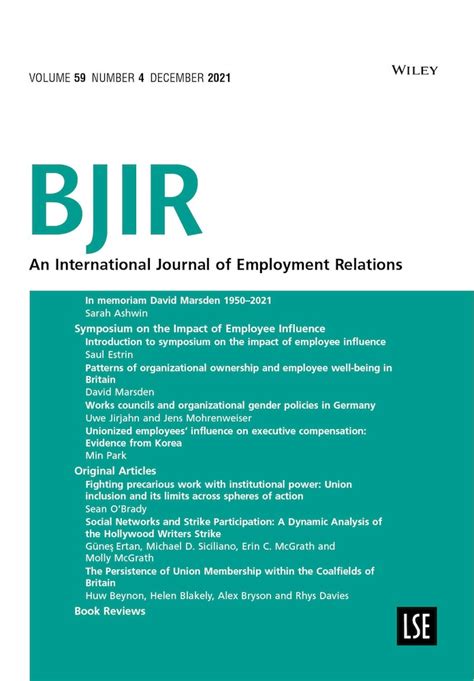
Works Councils and Labour Productivity: Looking beyond the Mean
in: British Journal of Industrial Relations, Nr. 2, 2015
Abstract
After more than 25 years of empirical investigation, the analysis of works council effects on establishment productivity is still an active field of economic research. I present first evidence for works council regression coefficients along the unconditional log labour productivity distribution in Germany. The highest (lowest) coefficients were found at the bottom (top) of the distribution, which suggests that works councils have the most beneficial effects at low levels of productivity. Importantly, coefficients are positive at each productivity level. The results shed light on a classical theoretical argument concerning moderating factors for the productivity effect of employee participation.
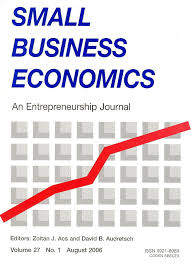
Economic Failure and the Role of Plant Age and Size
in: Small Business Economics, Nr. 3, 2015
Abstract
This paper introduces a large-scale administrative panel data set on corporate bankruptcy in Germany that allows for an econometric analysis of involuntary exits where previous studies mixed voluntary and involuntary exits. Approximately 83 % of all bankruptcies occur in plants with not more than 10 employees, and 61 % of all bankrupt plants are not older than 5 years. The descriptive statistics and regression analysis indicate substantial negative age dependence with respect to bankruptcy risk but confirm negative size dependence for mature plants only. Our results corroborate hypotheses stressing increasing capabilities and positional advantage, both predicting negative age dependence with respect to bankruptcy risk due to productivity improvements. The results are not consistent with the theories explaining age dependence via imprinting or structural inertia.
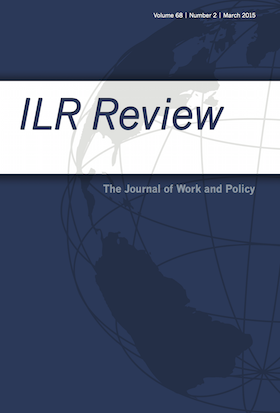
Is There Monopsonistic Discrimination against Immigrants?
in: ILR Review, Nr. 3, 2015
Abstract
The authors investigate immigrants’ and natives’ labor supply to the firm within an estimation approach based on a dynamic monopsony framework. Applying duration models that account for unobserved worker heterogeneity to a large administrative employer–employee data set for Germany, they find that immigrants supply labor less elastically to firms than do natives. Under monopsonistic wage setting, the estimated elasticity differential predicts a 7.7 log points wage penalty for immigrants thereby accounting for the entire unexplained native–immigrant wage differential of 5.8 to 8.2 log points. When further distinguishing immigrant groups differing in their time spent in the German labor market, their immigration cohort, and their age at entry, the authors find that the observed unexplained wage differential is larger for those groups that show a larger elasticity differential relative to natives. These findings not only suggest that search frictions are a likely cause of employers’ more pronounced monopsony power over their immigrant workers but also imply that employers profit from discriminating against immigrants.
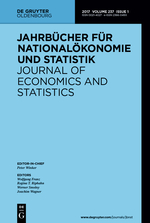
Intergenerational Transmission of Unemployment - Evidence for German Sons
in: Jahrbücher für Nationalökonomie und Statistik, Nr. 4, 2015
Abstract
This paper studies the association between the unemployment experience of fathers and their sons. Based on German survey data that cover the last decades we find significant positive correlations. Using instrumental variables estimation and the Gottschalk (1996) method we investigate to what extent fathers' unemployment is causal for offsprings' employment outcomes. In agreement with most of the small international literature we do not find a positive causal effect for intergenerational unemployment transmission. This outcome is robust to alternative data structures and to tests at the intensive and extensive margin of unemployment.
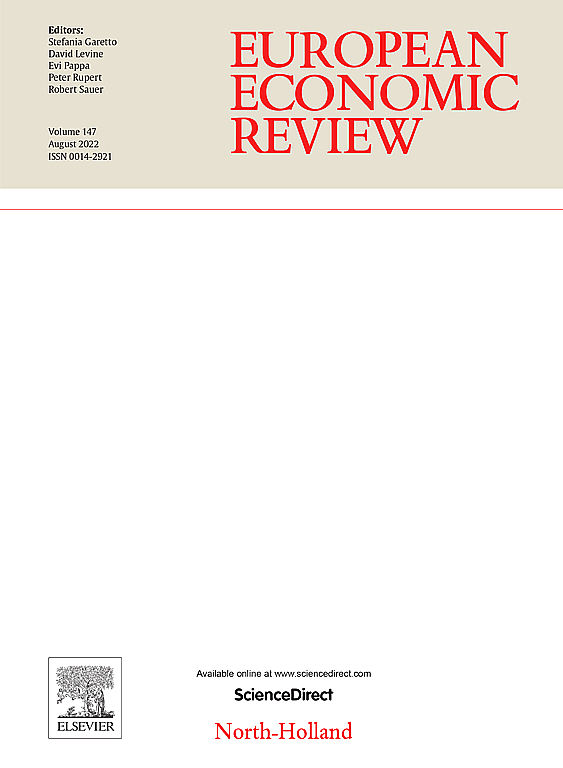
Returns to Skills around the World: Evidence from PIAAC
in: European Economic Review, January 2015
Abstract
Existing estimates of the labor-market returns to human capital give a distorted picture of the role of skills across different economies. International comparisons of earnings analyses rely almost exclusively on school attainment measures of human capital, and evidence incorporating direct measures of cognitive skills is mostly restricted to early-career workers in the United States. Analysis of the new PIAAC survey of adult skills over the full lifecycle in 23 countries shows that the focus on early-career earnings leads to underestimating the lifetime returns to skills by about one quarter. On average, a one-standard-deviation increase in numeracy skills is associated with an 18 percent wage increase among prime-age workers. But this masks considerable heterogeneity across countries. Eight countries, including all Nordic countries, have returns between 12 and 15 percent, while six are above 21 percent with the largest return being 28 percent in the United States. Estimates are remarkably robust to different earnings and skill measures, additional controls, and various subgroups. Instrumental-variable models that use skill variation stemming from school attainment, parental education, or compulsory-schooling laws provide even higher estimates. Intriguingly, returns to skills are systematically lower in countries with higher union density, stricter employment protection, and larger public-sector shares.
Arbeitspapiere
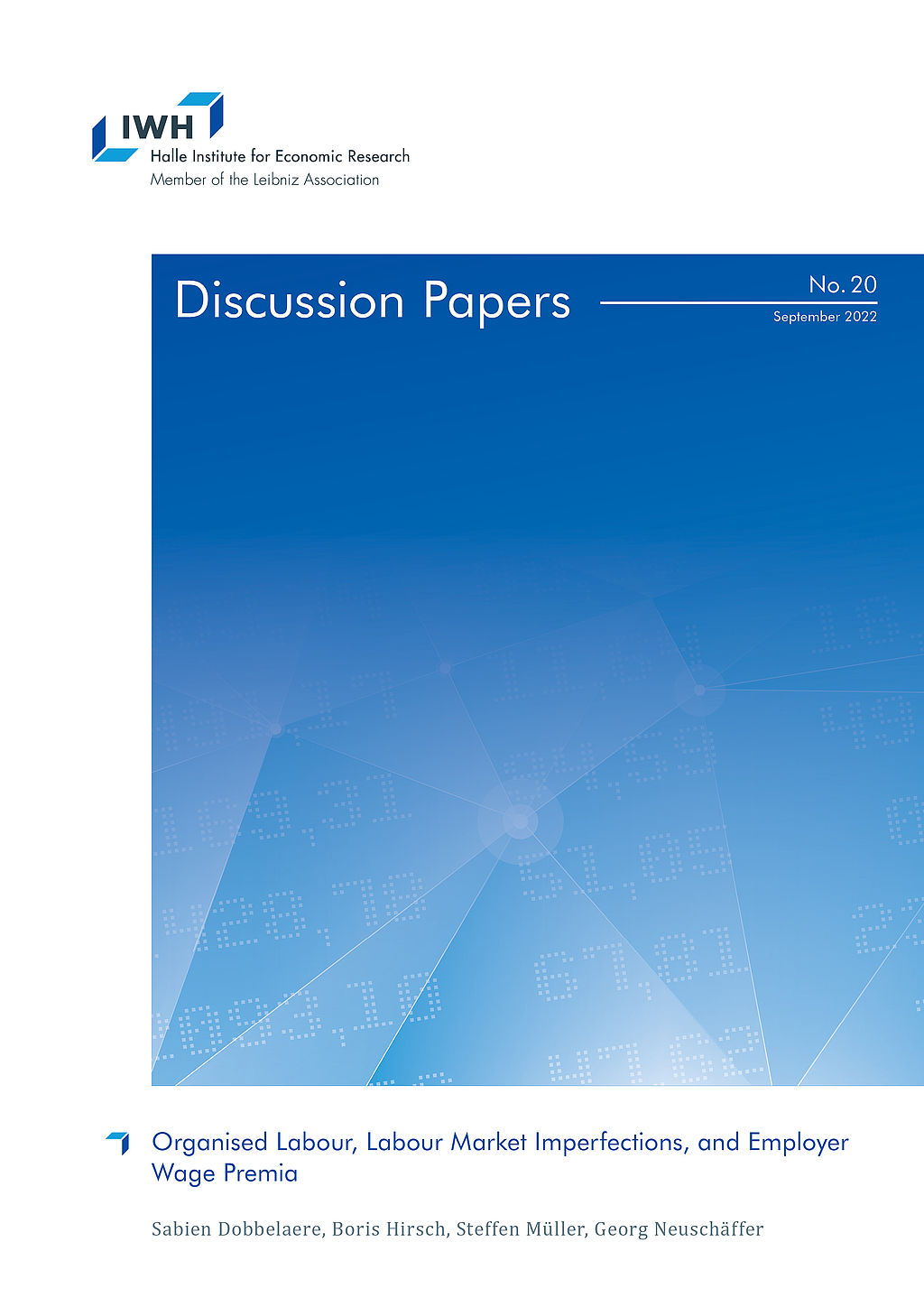
Organised Labour, Labour Market Imperfections, and Employer Wage Premia
in: IWH Discussion Papers, Nr. 20, 2022
Abstract
This paper examines how collective bargaining through unions and workplace co-determination through works councils relate to labour market imperfections and how labour market imperfections relate to employer wage premia. Based on representative German plant data for the years 1999–2016, we document that 70% of employers pay wages below the marginal revenue product of labour and 30% pay wages above. We further find that the prevalence of wage mark-downs is significantly smaller when organised labour is present and that the ratio of wages to the marginal revenue product of labour is significantly bigger. Finally, we document a close link between labour market imperfections and mean employer wage premia, that is wage differences between employers corrected for worker sorting.
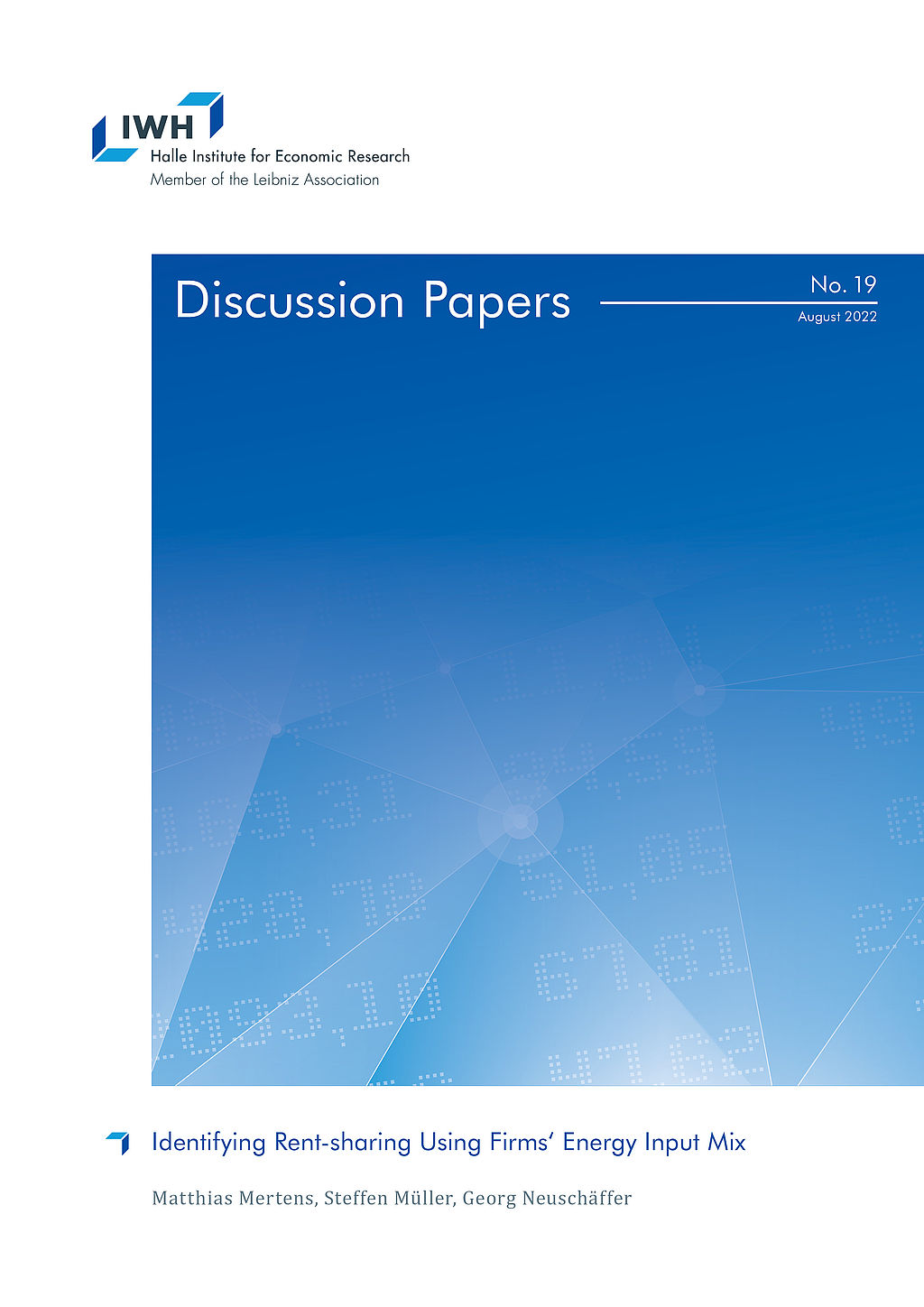
Identifying Rent-sharing Using Firms' Energy Input Mix
in: IWH Discussion Papers, Nr. 19, 2022
Abstract
We present causal evidence on the rent-sharing elasticity of German manufacturing firms. We develop a new firm-level Bartik instrument for firm rents that combines the firms‘ predetermined energy input mix with national energy carrier price changes. Reduced-form evidence shows that higher energy prices depress wages. Instrumental variable estimation yields a rent-sharing elasticity of approximately 0.20. Rent-sharing induced by energy price variation is asymmetric and driven by energy price increases, implying that workers do not benefit from energy price reductions but are harmed by price increases. The rent-sharing elasticity is substantially larger in small (0.26) than in large (0.17) firms.
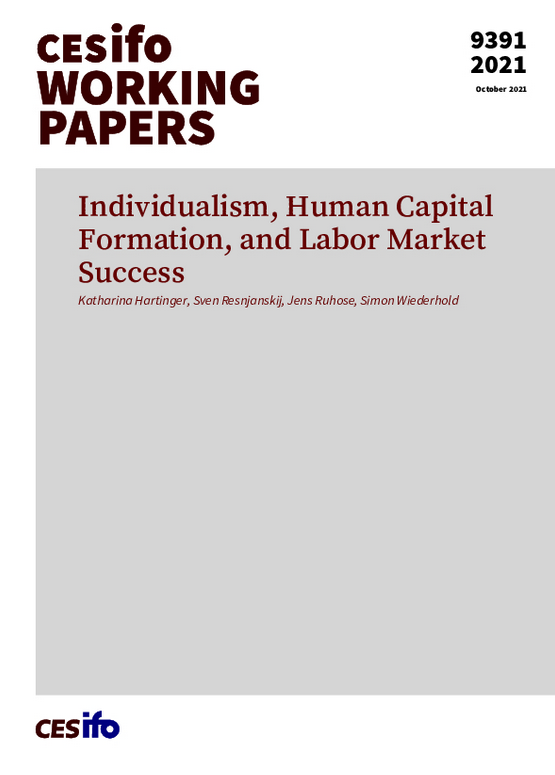
Individualism, Human Capital Formation, and Labor Market Success
in: CESifo Working Paper, Nr. 9391, 2021
Abstract
There is an ongoing debate about the economic effects of individualism. We establish that individualism leads to better educational and labor market outcomes. Using data from the largest international adult skill assessment, we identify the effects of individualism by exploiting variation between migrants at the origin country, origin language, and person level. Migrants from more individualistic cultures have higher cognitive skills and larger skill gains over time. They also invest more in their skills over the life-cycle, as they acquire more years of schooling and are more likely to participate in adult education activities. In fact, individualism is more important in explaining adult skill formation than any other cultural trait that has been emphasized in previous literature. In the labor market, more individualistic migrants earn higher wages and are less often unemployed. We show that our results cannot be explained by selective migration or omitted origin-country variables.
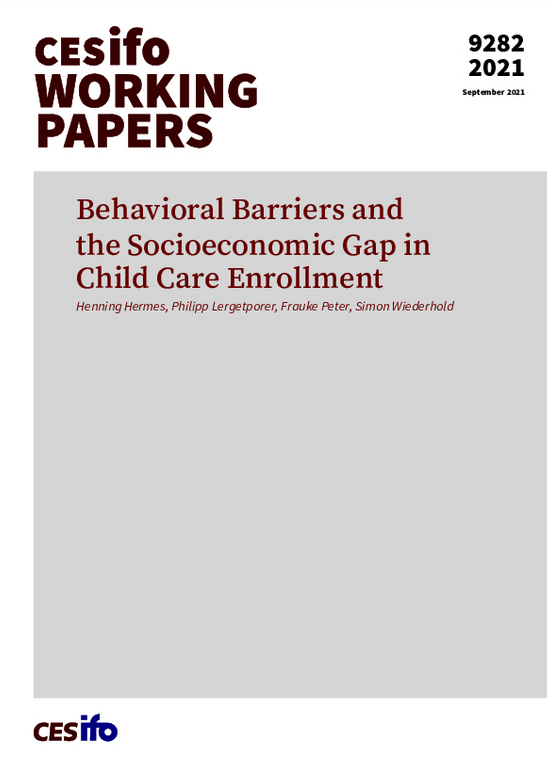
Behavioral Barriers and the Socioeconomic Gap in Child Care Enrollment
in: CESifo Working Paper, Nr. 9282, 2021
Abstract
Children with lower socioeconomic status (SES) tend to benefit more from early child care, but are substantially less likely to be enrolled. We study whether reducing behavioral barriers in the application process increases enrollment in child care for lower-SES children. In our RCT in Germany with highly subsidized child care (n > 600), treated families receive application information and personal assistance for applications. For lower-SES families, the treatment increases child care application rates by 21 pp and enrollment rates by 16 pp. Higher-SES families are not affected by the treatment. Thus, alleviating behavioral barriers closes half of the SES gap in early child care enrollment.
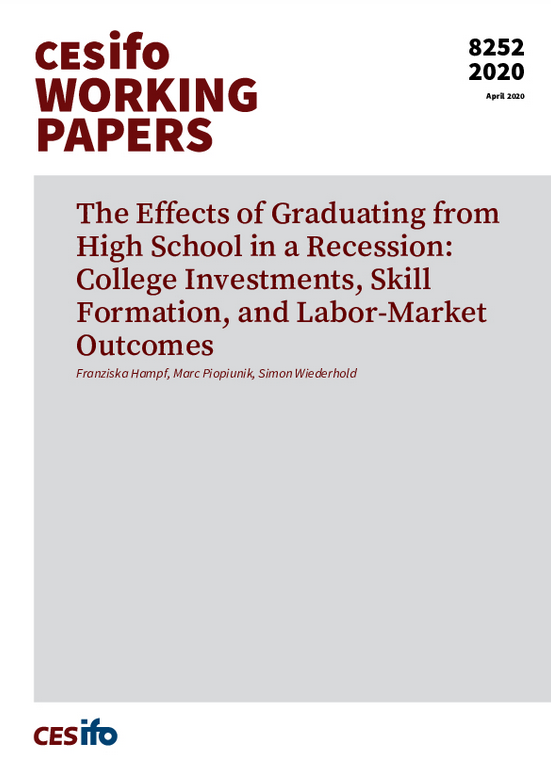
The Effects of Graduating from High School in a Recession: College Investments, Skill Formation, and Labor-Market Outcomes
in: CESifo Working Paper, Nr. 8252, 2020
Abstract
We investigate the short- and long-term effects of economic conditions at high-school graduation as a source of exogenous variation in the labor-market opportunities of potential college entrants. Exploiting business cycle fluctuations across birth cohorts for 28 developed countries, we find that bad economic conditions at high-school graduation increase college enrollment and graduation. They also affect outcomes in later life, increasing cognitive skills and improving labor-market success. Outcomes are affected only by the economic conditions at high-school graduation, but not by those during earlier or later years. Recessions at high-school graduation narrow the gender gaps in numeracy skills and labor-market success.


















